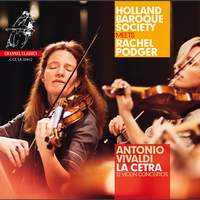Recording of the Week,
Vivaldi from Rachel Podger
Rachel Podger’s 2003 recording of Vivaldi’s Opus 4 set of Violin Concerti ‘La stravaganza’ picked up a Gramophone Award and set new benchmarks in the performance of the Venetian master’s concerti. Since then she has been concentrating mainly on the music of Bach and Mozart, but now has returned to Vivaldi, with another two disc set – this time of the Opus 9 concerti nicknamed ‘La cetra’.

By all accounts Antonio Vivaldi was an extraordinary man, incredibly arrogant and fun loving, and very good at promoting himself. Most importantly though he was an amazing violinist who dazzled his listeners. There are reports of people writing to their friends after a concert that they’d never heard a violin sound like that, or that they’d never heard technical passages played quite so brilliantly. His violin writing is not surprisingly often extremely challenging, and this set contains a number of really fiendish passages, but the fact that you hardly notice them is a credit to the extent to which Podger is on top of this music.
Vivaldi wrote over five hundred concertos – a lot of them for the violin but also many for other instruments including cello, flute, and oboe. They almost all follow the standard three-movement fast, slow, fast structure, and with other stylistic similarities common throughout, they famously prompted Stravinsky to joke that rather than writing five hundred concertos Vivaldi actually wrote one concerto five hundred times.
I met Rachel Podger a few weeks ago and put Stravinsky’s accusation to her (you can watch the whole video of our meeting via the link below). She quickly dispelled Stravinsky’s comment, and listening to this recording you can hear why. They are full of variety, in both character and expression, and while it is true that the faster movements often contain similar repeated passages, he develops them quite differently, and frequently in quite unexpected ways. The slow movements vary from simple charming melodies to melancholy, mysteriousness and sometimes quite an eerie feel.
Two of the concertos here are written for scordatura tuning, where some of the strings are tuned differently from the standard G, D, A, E pattern. In the final concerto of this set in particular this is really noticeable, and written in the key of b minor it produces quite different sonorities from those heard previously.
This is really attractive music to listen to, and with performances as full of vitality as these there is something immensely satisfying for the listener. Everything is carefully and beautifully phrased, and you sense a real chemistry between Podger and Holland Baroque Society. Made up predominantly of younger players, they bring a real energy and drive to the performances, while clearly listening and responding appropriately to every subtle nuance which Podger inflects in this music.
There is tasteful and appropriate ornamentation from both Podger and the continuo players within the ensemble, while tempos never get stuck in the slower and more tender middle movements. The recorded sound is clear and full of details, yet it also has a depth and bloom which works perfectly for this music.
I have so enjoyed listening to this recording and I hope you will too. Please do have a listen to the sound samples below, and enjoy the short video, which is a first of I hope many exclusives which we’ll be looking to bring you over the coming months.
Rachel Podger (violin), Holland Baroque Society
Available Formats: 2 SACDs, MP3, FLAC, Hi-Res FLAC, Hi-Res+ FLAC



